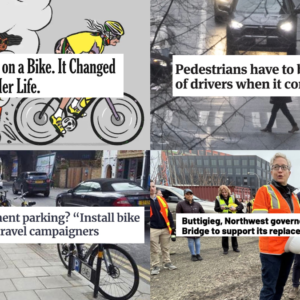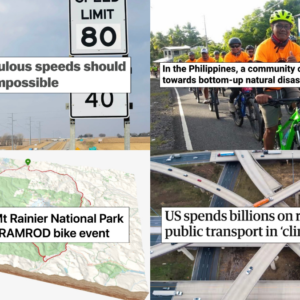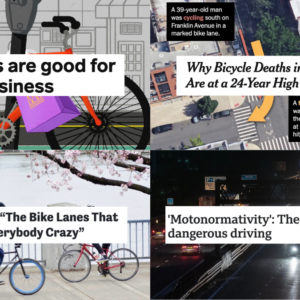Welcome to the week. Even though the sun isn’t supposed to last, the good vibes are unstoppable.
Here’s what our community has been talking about for the past seven days…
Putting out fires: Bike advocates and shop owners are worried that a new law in San Francisco aimed at e-bike battery safety has gone too far and will snuff out more than fires. (The San Francisco Standard)
A smarter warning: A new product called Copilot uses a mix of software and AI to go several steps beyond radar detection and sounds like the most advanced rear camera/light warning system on the market. (Ars Technica)
$100K track bike: The Factor bikes that will be used by the Australian Olympic track cycling team in the upcoming Paris games cost $97,979. (The Guardian)
Police hate competition: The lesson we should learn from the cancelation of automated enforcement camera program in Sacramento is to not let police anywhere near the program. (CBS News)
Why fight for better cities? After a Republican governor’s excellent comments on zoning reform went viral, it sparked a debate in urbanist circles about how far they’re willing to go to embrace someone with a very conservative, right-wing voting and policy history. (Streetsblog USA Opinion)
Bigger car, bigger fees: Another way we could get drivers of massive cars to pay more to use the roads is by hitting them where they park. (The Guardian)
Housing done right: It’s not just a biking boom that makes Paris so wonderful, it’s their focus on affordable, city-owned public housing and the walkable urbanism and “mixed society” the city creates through their role as landlords. This is how you built a great city! (NY Times)
Mature cyclists: Folks in the later stages of their lives are flocking to cycling vacdations because it’s more immersive and fun than sitting behind the wheel of a bus or an RV. (Conde Nast Traveler)
It’s all in your head: Next time you’re on a hard ride or dying up a climb, think about how some smart folks think fatigue is more about how your brain perceives it and not just how your legs and lungs perceive it. (Rouleur)
E-bike library: Buying an electric bikes brings up a lot of questions and even anxiety in some people, so being able to borrow one first via a neighborhood lending library just makes sense. Turns out e-bike libraries are all the rage. Who’s starting one in Portland? (Streetsblog USA)
E-bike incentives: With the hope that some of you out there are working on an e-bike purchase subsidy for Oregon in a future legislative session, here’s how the sausage is being made in California. (Streetsblog Cal)
Thanks to everyone who sent in links this week. The Monday Roundup is a community effort, so please feel free to send us any great stories you come across.








Thanks for reading.
BikePortland has served this community with independent community journalism since 2005. We rely on subscriptions from readers like you to survive. Your financial support is vital in keeping this valuable resource alive and well.
Please subscribe today to strengthen and expand our work.
The story by Joe Cortright on the governor’s to terminate the regional mobility pricing program is worth adding to the list. I think this is a very good analysis of the implication of this decision.
https://cityobservatory.org/monkey-wrenching-road-pricing/?utm_source=substack&utm_medium=email
The “mixité sociale” housing policy championed by the Communists in Hidalgo’s coalition is designed to combat gentrification and undermine private development. It has absolutely nothing in common with the speculative private-sector gentrification that so many “urbanists” carry water for.
The lesson we should learn from the cancelation of automated enforcement camera program in Sacramento is to not view your system as a funding source to be unplugged when ticket revenues fall. Nothing in the article even hinted at “cops don’t like competition”. From what’s there, this is all about money.
Perhaps I was too quick with that one. The way I read it, the program was wildly successful at reducing crashes, but because the police recommended cancelling the program due to overhead costs, it was cancelled. I know that often the police playing a role in those programs makes it expensive and more cumbersome. IMO the answer isn’t to stop the program, the answer is to remove police from the equation like Oregon did. Without police having to review the tickets or being involved, I’m sure costs would come down.
Follow up from KUOW with the survivor of the cougar attack East of Seattle and the story of how her teammates defended her.
https://www.kuow.org/stories/cougar-attack-washington-state-cyclists